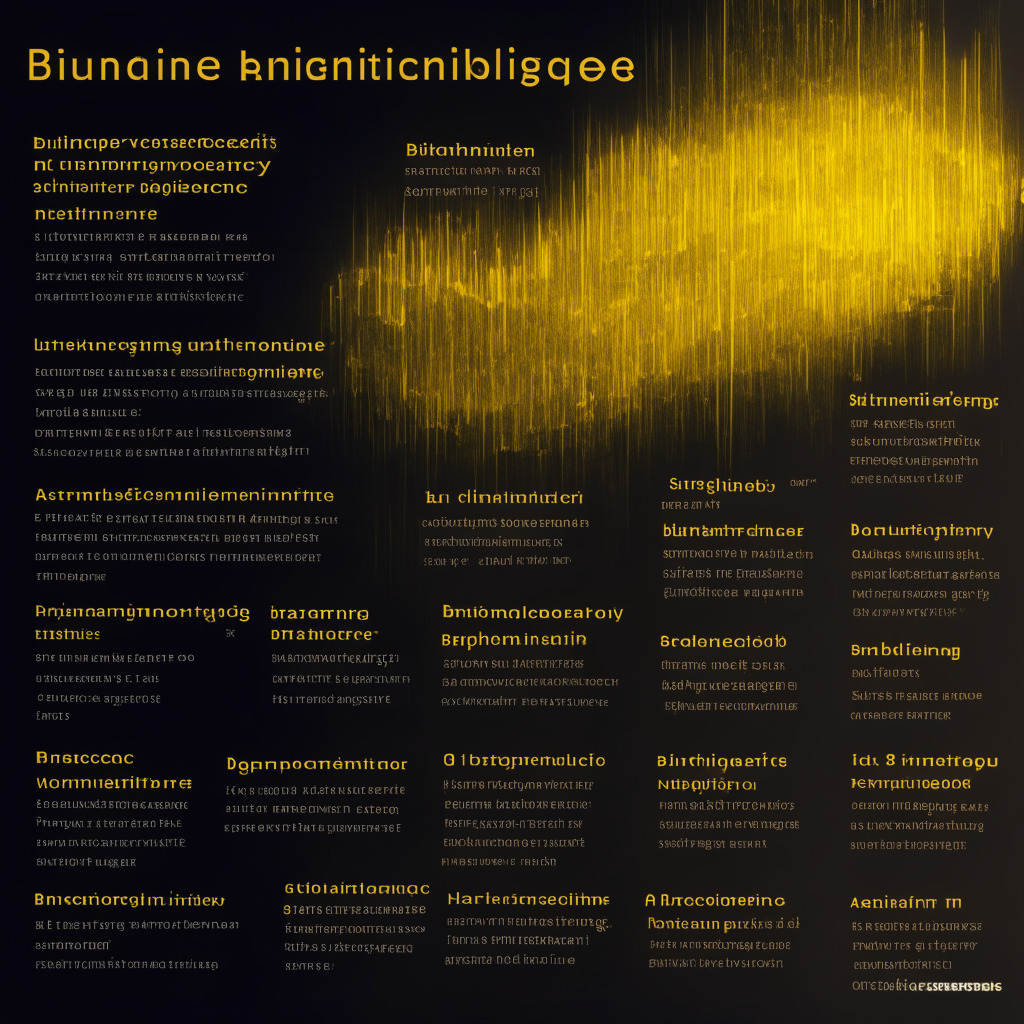The “Darknet Marketplace and Digital Currency Crimes Task Force” showcases the growing concern related to digital currencies in crime. This task force, consisting of agents from various federal agencies, seeks to dismantle criminal organizations taking advantage of digital currencies’ anonymity and raises questions about the future of cryptocurrencies and the increasing need for regulatory measures.
Search Results for: APT
End of Non-Securities Crypto Trading: Legal Implications & Future Adaptions
The era of trading cryptocurrencies as non-securities may be ending, says Itai Avneri, COO at INX. With legal implications affecting exchanges, a focus on categorizing cryptocurrencies within the financial landscape is crucial for compliance with regulatory guidelines and balancing innovation with financial security.
Binance’s European Exodus: Sign of Sinking Ship or Resilient Adaptation?
Binance, the world’s largest crypto exchange, faces legal complications with global financial watchdogs, leading to key European executives departing the company. This raises questions about Binance’s long-term stability in the European market and highlights the importance of market research before investing in cryptocurrencies.
Wyre Shuts Down: Is the Bear Market to Blame or Lack of Adaptability? Pros and Cons Explored
Crypto payments platform Wyre is shutting down after nearly ten years, attributing the closure to financial challenges instead of regulatory issues. The company experienced setbacks, including a failed acquisition, withdrawal limits, and layoffs, highlighting the importance of adaptability and resilience in the volatile crypto market.
Emerging Exchanges Thrive Post-FTX Collapse: Lessons in Adaptability & Transparency
The Nansen report reveals a surge in trading volumes for smaller exchanges like Kraken, Bybit, and Bitget following FTX’s collapse, while established exchanges faced losses. Amid regulatory crackdowns, decentralized exchanges (DEXs) remained stable, and a shift towards greater transparency is observed within the crypto industry. Adaptability and transparency are crucial for survival and growth in the fluid blockchain landscape.
Raptor Token vs. Wall Street Memes Coin: Meme Crypto Investments Face Off
RAPTOR, a cryptocurrency based on the Raptor Jesus meme, saw its value skyrocket 3,000% since launch. Meanwhile, Wall Street Memes launched a $WSM token presale, raising $7 million in two weeks. Both RAPTOR and $WSM generate excitement, but crypto enthusiasts should be aware of risks investing in new and unproven projects.
Crypto Industry’s Adaptability Amidst SEC Crackdown: Blockstream CEO’s Optimism
Adam Back, CEO of Blockstream, expresses confidence that the crypto industry will adapt and find alternative avenues amid regulatory pressures from the SEC. He believes demand for cryptocurrencies and the market’s ability to evolve will ensure its resilience, as seen in the recent Bitcoin mining migration from China to North America.
Restructuring of IOG: Adapting to Market Dynamics or Causing Workforce Disruptions?
Input Output Global (IOG), the developer behind Cardano, is restructuring to transform into a venture studio, leading to several layoffs. The new business model aims to maintain a smaller core and establish spin-offs within the company’s ecosystem, focusing on efficient and groundbreaking technology amidst the rapidly evolving blockchain and cryptocurrency landscape.
WSM Token Presale: Transforming Meme Coin World and Captivating Retail Investors
Wall Street Memes ($WSM) token presale is disrupting the crypto industry, drawing inspiration from the Wall Street Bets movement and top NFT projects. Surpassing $1.3 million in a week, the community’s size almost guarantees listings on top-tier crypto exchanges, potentially redefining power dynamics in digital value markets.
Nansen Layoffs and Crypto Industry Challenges: Adapting to Market Volatility and Uncertainty
Nansen, a blockchain analytics platform, recently announced a 30% workforce reduction due to rapid scaling beyond their core strategy and the ongoing crypto bear market. This raises concerns on the sustainability of businesses within the crypto industry and the impact of market fluctuations on workforce stability.
Crypto Exchanges Split on Canadian Regulations: Adapt or Withdraw?
In response to the latest regulatory developments in Canada, cryptocurrency exchange Bybit has decided to withdraw from the Canadian market effective May 31st. This move highlights the growing divide among exchanges operating within Canada, as authorities exercise stricter oversight over the cryptocurrency sector.
Surviving the Storm: Indian Crypto Exchanges Adapt Amid Tax Hikes and Market Decline
Indian crypto exchanges face survival challenges due to stringent tax regulations and declining trading volumes. A 30% tax on crypto profits and a 1% tax on transactions are impacting the industry. However, India’s role as G-20 president in 2023 might provide hope for globally coordinated crypto rules.
Stargate’s Response to Fantom’s anyUSDC Crisis: A Lesson in Crypto Adaptability and Resilience
Stargate, the LayerZero cross-chain bridge protocol, unveils a proposal to mitigate risks and protect its ecosystem integrity amid concerns over Fantom’s primary USDC asset, anyUSDC, and recent events affecting Multichain. The plan highlights the importance of adaptability and resilience in the evolving crypto industry.
OpenAI’s EU Dilemma: Adapting to AI Regulations or Withdrawing Services?
OpenAI CEO Sam Altman hints at potentially withdrawing ChatGPT services from Europe if compliance with upcoming EU AI regulations is unattainable. Altman calls for revising proposed regulations, with concerns over revealing copyrighted materials used in AI tools.
Magic Eden’s Chapter II: Rethinking Solana NFT Market Dominance and Addressing Criticisms
Magic Eden’s “Chapter II” initiative focuses on re-establishing its dominance on the Solana network by aggregating listings from competing NFT marketplaces, addressing previous criticisms, and incentivizing traders with fee alterations. Competitor Tensor criticizes Magic Eden over co-sign requirement and security concerns remain unaddressed.
Sorare’s Adaptation to French NFT Regulations: A Closer Look at Blockchain Challenges
Web3 fantasy sports company Sorare adapts to France’s new regulatory framework for NFTs by creating an alternate entry method for players. Sorare collaborates with the French National Gaming Authority while developing its long-term roadmap amidst ongoing regulatory discussions. This highlights challenges in a rapidly evolving regulatory environment for blockchain-based companies.
De-dollarization and the Future of Stablecoins: Adapting to a Changing World Economy
The decreasing dominance of the USD as a global reserve currency raises concerns about the future of USD-pegged stablecoins. As countries look for alternative currencies and digital assets, various stablecoins pegged to different fiat currencies or assets could emerge, ensuring stablecoins evolve and remain relevant even if the USD loses its hegemony.
Binance AUD Suspension: Unveiling Crypto Market Vulnerabilities and the Need for Adaptability
The recent Binance suspension of AUD services highlights vulnerabilities and the need for adaptability within the cryptocurrency market. This incident emphasizes potential risks when relying on external service providers and reminds users of the importance of thorough research before investing.
Blockchain Battles Miami Housing Crisis: Captain Haiti’s $5M NFT-Real Estate Initiative
Captain Haiti Foundation partners with Dargent Group, raising $5 million to utilize blockchain technology to combat Miami’s housing crisis and preserve Haitian culture. The initiative focuses on helping Little Haiti residents acquire land and real estate, while limited edition NFTs facilitate unique real estate market opportunities.
Balancing Crypto Regulation and Innovation: Can the SEC Adapt?
The SEC’s heavy-handed enforcement in the crypto market faces criticism, with Ripple’s Chief Legal Officer, Stuart Alderoty, calling it a constitutional issue, not a crypto one. Striking a balance between regulation and fostering innovation remains a hotly contested subject.
Blockchain Future: Captivating Potential vs. Real-World Limitations
Blockchain technology holds potential to revolutionize industries like finance, healthcare, and supply chain management by enhancing security, transparency, and efficiency. However, challenges like scalability, regulatory hurdles, and environmental impact must be addressed to fulfill its promise.
Binance US Reducing CZ’s Stake Amid Regulatory Scrutiny: Adapting or Fleeing?
Binance US and Changpeng Zhao (CZ) are exploring options to reduce CZ’s stake amid intense scrutiny from United States federal regulators. Allegedly attempting to reduce his stake since last summer, Binance US executives now explore ways to decrease CZ’s influence, fearing difficulty obtaining regulatory licenses with him as majority owner.
From Crypto Mining to AI Training: The GPU Balancing Act and Miner Adaptation
Ethereum’s migration to proof of stake leaves miners exploring AI training as an alternative use for their GPUs. However, optimal GPUs for crypto mining and AI training have different specifications. Cryptocurrency mining relies on high hash power while AI training primarily depends on vRAM capacity, creating challenges for miners transitioning between the two.
Stablecoin Issuers Adapt Strategies Amid US Debt Ceiling Crisis: Different Approaches Compared
Stablecoin issuer Circle has revised its reserve treasury strategy to mitigate potential risks from a US debt default, converting to short-dated U.S. Treasuries. As stakeholders in the blockchain industry adjust strategies, Circle aims to insulate itself from risks associated with a possible U.S. debt crisis.
Mandela Comics Gaming Adaptation: Exploring Opportunities and Challenges with NFT Integration
Blair Witch Project Executive Producer, Kevin Foxe, commits to developing a video game adaptation of Mandela comics featuring NFTs across multiple blockchains, ushering in opportunities and engagement for gaming enthusiasts. However, potential challenges include high transaction fees, environmental impact, and market saturation.
ATPBot’s Integration with Binance API: AI Trading Pros, Cons, and Market Adaptability Conflict
ATPBot integrates with Binance API to offer AI-powered trading strategies, optimizing cryptocurrency transactions. The platform utilizes mature trading strategies, real-time market data analysis, and natural language processing to adapt to market conditions and execute profitable trades. However, users should be cautious of potential risks and remain well-informed while using automated trading systems.
Coinbase Borrow Discontinued: Diminishing Interest, Agility, and Industry Adaptation
Coinbase, the largest US crypto exchange, recently announced the discontinuation of its lending product, Coinbase Borrow, on May 10th due to diminishing interest. This move highlights the need for crypto companies to remain agile, prioritize customer-aligned products, and adapt to an evolving market and regulatory environment.
Revolutionizing Crypto Trading with AI: Bitcoin Oracle’s Transparent & Adaptive Platform
Impact Marketing introduces its machine learning crypto asset trading platform, Bitcoin Oracle AI, which offers transparency, adaptability, and a blend of AI and human strategies. The platform collects and analyzes real-time crypto market data to generate potentially profitable trading signals, adapting to the ever-changing cryptocurrency landscape.
Aptos Foundation’s $3.5M Blockchain Grants: Boosting Innovation or Execution Concerns?
The Aptos Foundation pledges over $3.5M to 50 project teams dedicated to scaling Aptos blockchain and fostering innovation within the Web3 ecosystem. Grants focus on public good services, infrastructure, and open-source development, covering categories like Developer Tooling, Infrastructure, Education, and Ecosystem initiatives.
Unravelling the Shadows: FTX Collapse Focused on Legal Professional Involvement
The collapse of FTX exchange puts the spotlight on the role of lawyers facilitating loans to co-founder, Gary Wang. Claims are made on a potential $8bn shortfall prior to FTX’s collapse. Investigations into these claims, Wang’s and former Alameda CEO Caroline Ellison’s role in possible conspiracy and fraud are ongoing, packed with legal intricacies and complex crypto-law conundrums.
Balancing Act: Choosing the Right Consensus Mechanism for Your Blockchain Project
“Choosing a consensus mechanism for a blockchain project is complex and multifaceted, involving the balancing of security, sustainability, scalability, regional preferences, and long-term project goals. The decision requires understanding and navigating through various project-specific details and an ever-evolving technology landscape.”
Navigating the Cryptostorm: The Rise and Fall of Binance’s Billion-Dollar Recovery Initiative
“Binance’s ambitious Industry Recovery Initiative (IRI), a billion-dollar fund to rescue struggling cryptocurrency startups, has under-delivered. Only $15 million of the declared $1 billion has been deployed amidst regulatory pressures and lack of suitable investment opportunities. However, the initiative retains its significance in the volatile cryptocurrency ecosystem.”































